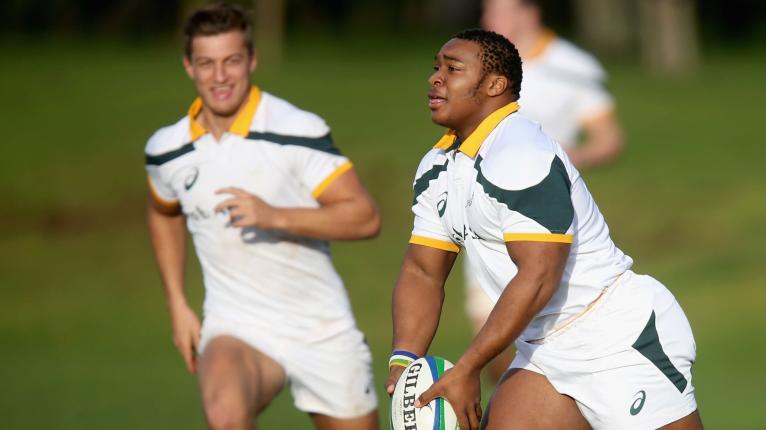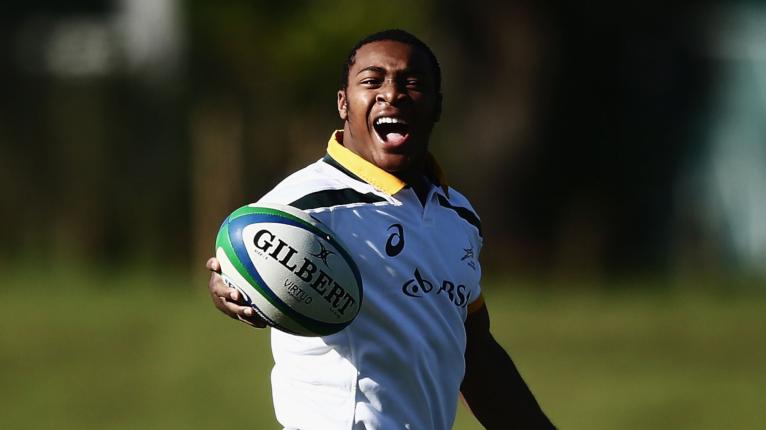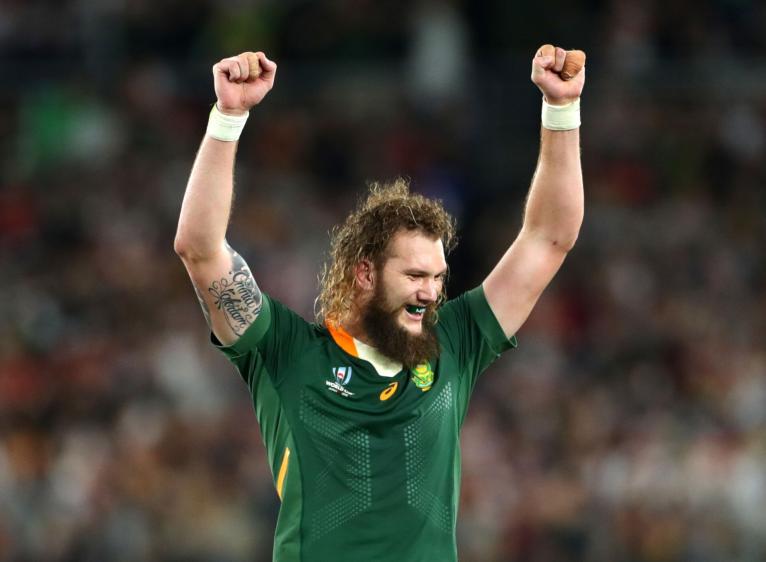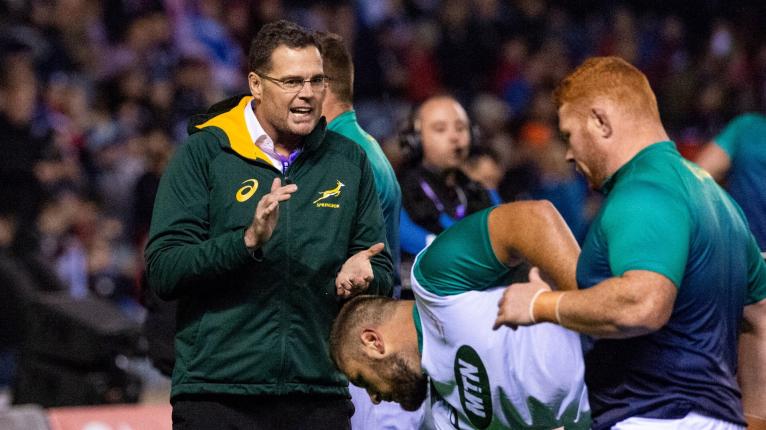'I've never told this story before - I don't even think my Mrs knows'

As a little boy, Joseph Dweba would beg his parents for rugby boots, pleading for the most basic, mundane essentials that his friends and rivals took for granted. Every time he asked, they had to tell him no. There simply wasn’t enough money.
The three Dwebas were stuffed into a cloying one-bedroom shack in Carletonville, fifty miles southwest of Johannesburg in South Africa’s Gauteng province. Much of the land there was owned by the mining companies who plundered gold from beneath its sun-blistered crust. Townships sprung up where the workers and their families lived in a rickety warren of corrugated iron. Sanitation was poor and HIV rife.
How horribly ironic to be reared in destitution with the most coveted mineral on Earth under your feet, but it was here among the mine shafts, the drugs and the crime that the Cheetahs hooker’s journey began.
Dweba’s father, like many others in the town, worked below ground, but squandered most of his wage. He had seven children from previous relationships. His mother, who made 1200 rand a month (roughly £53 at the current exchange rate) working in a kitchen, had three. Imagine her dismay when she returned home to find her modest abode engulfed in flames.
“I’ve never told this story before – I don’t even think my Mrs knows,” Dweba says. “I came back from primary school and there were a lot of insects in the house, so I took a candle, lit it up and wanted to kill them.
“But I was right next to the fridge – I was stupid, I didn’t know. The fridge started sparking and burned the whole house down. I had to go and stay with another woman while they rebuilt the house.
“Yes, my mum was angry with me, but she understood I was a kid and I knew nothing. She was the person who always looked after me. She always supported me.”
When Dweba was asked along to his first rugby session, he hated it. He walked miles home in bucketing rain afterwards, with his mother so worried she greeted him with an almighty smack across the chops.
But he was bullied by the older kids in the neighbourhood. And soon, the sport became a tool for him to “bully them back”. A new coach, Mr Badenhorst, awoke in Dweba a love for rugby that still burns bright, driving him wherever he needed to go and making sure he never went hungry.
“He did that for four years,” Dweba says. “He took me to provincials out of his jurisdiction out of love, all of these places to go to try-outs for the Golden Lions.
“He is hardcore Afrikaans, but he had a soft spot for me. I didn’t understand what he was doing in my life, picking me up, taking me home, buying me food. Only now as I sit back do I realise that this guy had a huge impact on my life to get to where I am today.

“My parents stay opposite the school now, so I still go and thank him. And I go see the kids at the school too. I promise him that if I play for the Springboks, he will be the person I give my Bok jersey to.”
In his quest to capitalise on rampaging ball-carries, striking ability and lust to make it, Dweba changed high school three times. Coaches shifted him from centre to number eight to the front-row. When he went from a local English-speaking school to the Afrikaans-dominated Jan Viljoen, he had to repeat a year while he learned to follow classes in the new language. He was the school’s only player to make the Lions under-16 side. They would drop him off at training, and leave him to find his own way back to Carletonville.
“My parents did not have a car and even if they did, they don’t know the distances or where I was supposed to go,” he says. “There was a point where I walked back.
“My friend would come to pick me up and he told me, ‘Listen, these people are wasting your time, they don’t care about you, only about the school’.”

On he went, from Jan Viljoen to Hoerskool Florida. There, his new team-mates would buy boots for him. Their fathers drove him to and from Craven Week, South Africa’s great gladiatorial stage for boys to battle before scouts from across the land.
To get home from school, Dweba would have to take a combination of trains and taxis, burning through money his parents did not have. There was a kindly family who often took him in at weekends, made sure he had a roof over his head and food in his belly.
Ultimately, his talent pierced the hardship. He was the only Lions player to be selected for SA Schools, and the only schoolboy to make the 2014 South Africa Under-20 squad, a team led by Handre Pollard that went all the way to the Junior World Championship final.
“I had to go to Cape Town to meet up with SA Schools,” Dweba says. “I had never been on a plane before, I didn’t know where the terminal was, I didn’t even know what a plane looked like – I’d only seem them way up in the sky and never been close to them.
“Then the tallest guy I’ve ever seen comes up and grabs me on the head and says, ‘Hi Joe’. It was RG Snyman.

“With the Under-20s, I didn’t know what coach Dawie Theron wanted from me. He told me I would play, I gave everything in training, but he never gave me proper game time.
“Then Malcolm Marx tore his ACL in training, and the second-choice hooker, Corniel Els, tore his ACL in the final against England. I had to go on. Wow.
“I made my line-outs, my scrums, my carries. After the game, the boys, Jesse Kriel and them, were like, ‘You’re a beast’. What do you mean? I didn’t know what was going on, my eyes were so big. They told me I played a hell of a game.
“Dawie Theron comes to me and says in Afrikaans that it’s a shame he didn’t play me earlier, because he can see how hungry I was. He tells me straight – ‘You are going to be my starting hooker next year’.”
His coaches were astounded that such a brilliant young player did not have an agent at 19 – Dweba didn’t even have a phone at that stage, far less an advocate to negotiate contracts and secure goodies on his behalf. He found a reliable representative, who helped him sign professional terms with the Cheetahs.
Check out @myoddballs – raising awareness of Testicular Cancer pic.twitter.com/cPi3P8kBXf
— Joseph Dweba (@josephdweba2) November 15, 2019
Dweba began life in Bloemfontein poor and car-less and Franco Smith’s fifth-choice hooker, finishing up at Louis Botha, high school number four. He borrowed Smith’s bike to cycle the 10km to training twice a day. He says Rory Duncan, who led the team’s maiden Pro14 campaign, “promised me the moon”, but his opportunities on the field were as rare and fleeting as a lunar eclipse.
“Sorry for my language, but I have been bullshitted and fucked around so many times. I was getting a minute here, two minutes there, never got clear game time,” he says.
“Torsten van Jaarsveld was first-choice hooker and I was promoted to the bench when he injured his neck. Tortsen comes back, and Rory tells me that the senior guy is back so we just have to make space for him.
“I’m saying, ‘Coach, you just said a month ago that Torsten has to work his way back into the team – it looks like he’s walking back into it, and worst of all, he’s starting’. That pissed me off a lot. And I did not understand.
“The defence coach tells me to be patient – I can’t be patient for that long, my contract is coming to an end, I need to prove myself, and the Mrs is also pregnant with my kid. I’m giving my all on the training sessions, but this guy is not recognising me and not giving me a contract.”
The Cheetahs offered a meagre new deal, and then withdrew it when Dweba took his time to respond. Their recruitment chief told him that players were investments, and so far, the franchise wasn’t getting much return on its money.
“I went to Harold Verster, the CEO of the company, and told him, ‘You are the only guy I’m telling this, but we’re having a baby, my contract is coming to an end and I want to stay at the Free State, so please help me out’,” Dweba says.
“They gave me the exact same offer that they had taken off the table. It was a shitty contract. I don’t care, I’m having a baby I’ll sign the contract and I’ll work my ass off. I’m going to show them something different about myself.
“Torsten had just left, he told me as he was leaving, ‘This is your jersey, take it, and if you don’t take it, then you’re stupid’.”
Dweba trained like a warrior possessed, smithereening team-mates, thundering across the paddock as through the grass on which he ran was a mortal enemy. Little baby Khayone arrived and with fatherhood came a great swell of responsibility.
“Franco Smith himself did not understand what was happening to me. I was hungry. This was my time. When the Currie Cup hit, I just went all-out. That’s when people started to recognise, there’s the Joseph Dweba we know – there he is.”
This season, under Hawies Fourie, Dweba has been stupendous, a dreadlocked colossus wreaking mayhem wherever he rumbles. He was named Currie Cup player of the year after helping propel the Cheetahs to the famous old trophy. In the Pro14, he has bludgeoned his way to seven tries in 12 outings and the team’s line-out is among the most effective in the league.
For all South Africa’s riches at hooker, a Springboks call cannot be far away, even with an overseas contract at Bordeaux-Begles, who finished the abandoned Top 14 season in first place, in the offing. “I felt like Rassie Erasmus could have invited me to alignment camps before the World Cup, even though I wasn’t in his plans for Japan,” Dweba says. “It would just be good to see how they work and where are my strengths and weaknesses. I never heard anything.

“Jacques Nienaber, the new coach, said I am in their plans and that moving to France won’t disadvantage me. If I stayed in South Africa, it is much easier for them to call me up, but if I’m shooting the lights out in the Top 14, I’m definitely going to be chosen.
“I have to look after my family. We can put the money we earn in France aside. I feel like I can fit in properly in the league, and I feel like I can dominate, I want to dominate. I want them to know who I am and what I stand for.
“And it’s not just the money. I could have easily chosen a different club – I went to see Castres, Toulouse, Lyon, and the last one was Bordeaux-Begles. That solidified everything for me, because the head coach [Christophe Urios] was a hooker himself, he would help me improve my skills and the team is very good, I’m not just going there to fill in the numbers.”
The big hooker is not so much silencing his doubters as clamping their teeth together with a vice. At 24, he can secure his family’s future by moving to France, while testing himself against the behemoths of the Top 14. Bordeaux-Begles may have lost the great Semi Radradra, but are tooling up in a serious way with Dweba, the absurdly proportioned Ben Tameifuna, and Ben Lam, the fabulous winger, all joining for the new campaign.
If it wasn’t for rugby, Dweba would have followed his father to the Carletonville gold mines. These days, he might very well be among the scores of unemployed miners in dire straits as the industry withers.
Instead, life is very different. It is happy and exhilarating and full of opportunities, thanks to a heart that shines brighter than any gold chiselled out of the Gauteng dirt.
“A few of the guys that I grew up with have died due to drugs and overdoses, some died from HIV,” he says. “Rugby took me away from all of that. It was frustrating moving from school to school, further away from my parents, but it helped me in the long run.
“I can provide for myself, for my parents, and for my kids now. I always say that I am doing this for my kid and I want him and my kids to come to have a better life than I did. I don’t want to spoil them, but I want them to be comfortable.
“That’s my story. Maybe somebody else has a bigger and better story, but this is mine.”






























































